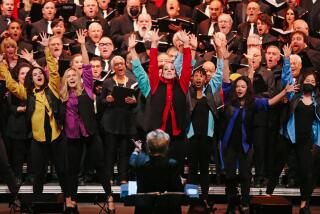MUSIC REVIEW : Currie, Chorale Try ‘Gerontius’ at the Pavilion
- Share via
In certain quarters, Edward Elgar’s “The Dream of Gerontius” is regarded as something of a national monument.
The grandiose oratorio, completed in 1900, may strike a few callous or unchauvinistic souls as a quaint Victorian relic. Nevertheless, as long as there’s an England, Elgar’s lofty rhetoric--aligned with his meandering Wagnerism and prim piety--will be ardently admired and fiercely defended.
The great British choral societies, moreover, have to do something festive once in a while besides “Messiah” and “Elijah.”
“Gerontius” has never fared particularly well, however, as an export commodity. American connoisseurs know it from recordings and seldom hear it in the concert hall.
Saturday night at the Dorothy Chandler Pavilion, John Currie opened his second season as director of the Los Angeles Master Chorale with what was billed as the the first full-scale performance of “Gerontius” in this city. It obviously was a labor of love for the Scottish maestro.
Currie engaged two authoritative British soloists, enforced unexpected suavity and point with the somewhat understaffed Sinfonia Orchestra, and persuaded the somewhat thin-sounding, reconstituted Chorale to sing with urgency and flexibility.
Elgar’s sprawling romanticism and easy religiosity were well served and, where possible, understated. It was easy to savor the shimmering textures, the heroic outbursts, the chromatic modulations, the grateful vocal lines.
Even an insensitive colonial could applaud the bold dramatic contrasts, the ambitious yet often delicate juxtaposition of mortal agonies, diabolical insinuations and angelic benedictions.
The inherent craftsmanship in the piece is striking, the expressive sincerity beyond doubt. The convoluted invocations of “Parsifal” actually make sense, in this context, as do the raucous, possibly unconscious, references to Verdi’s “Dies Irae.”
Nevertheless, the unindoctrinated listener cannot always ignore Elgar’s longueurs or his close-to-vulgar climaxes. The often swollen sentiment and the sometimes push-button spirituality in “Gerontius” are not everyone’s cup of tea, as it were.
Elgar may have been trying to create music worthy of a Leonardo. Unfortunately, much of it stubbornly suggests a kitschy greeting card.
Be that as it may, one was grateful for an opportunity to experience the work firsthand. One also had to be grateful for a performance so strong in conviction and authenticity.
John Mitchinson, the celebrated British heldentenor, made an unheralded debut in the title role. A former student of Heddle Nash, the Gerontius of the historic Malcolm Sargent recording, he conveyed the doubt, the fear, the wonder and, ultimately, the resignation of the mortal protagonist with clarity and economy.
He also sang very beautifully, as long as the mood could be introspective and the dynamic gentle. Under pressure, his tone tended to become tight and alarmingly unsteady.
Although Christine Cairns does not command the rich and heavy mezzo-soprano of her most illustrious British predecessors as the Angel, she found ample compensation in lyrical radiance.
Scott Henderson, chairman of the music faculty at Cerritos College, brought a forceful, monochromatic baritone to various incidental duties.
It was, in all, a good night for dignified bombast and sugar-coated mysticism.
More to Read
The biggest entertainment stories
Get our big stories about Hollywood, film, television, music, arts, culture and more right in your inbox as soon as they publish.
You may occasionally receive promotional content from the Los Angeles Times.










